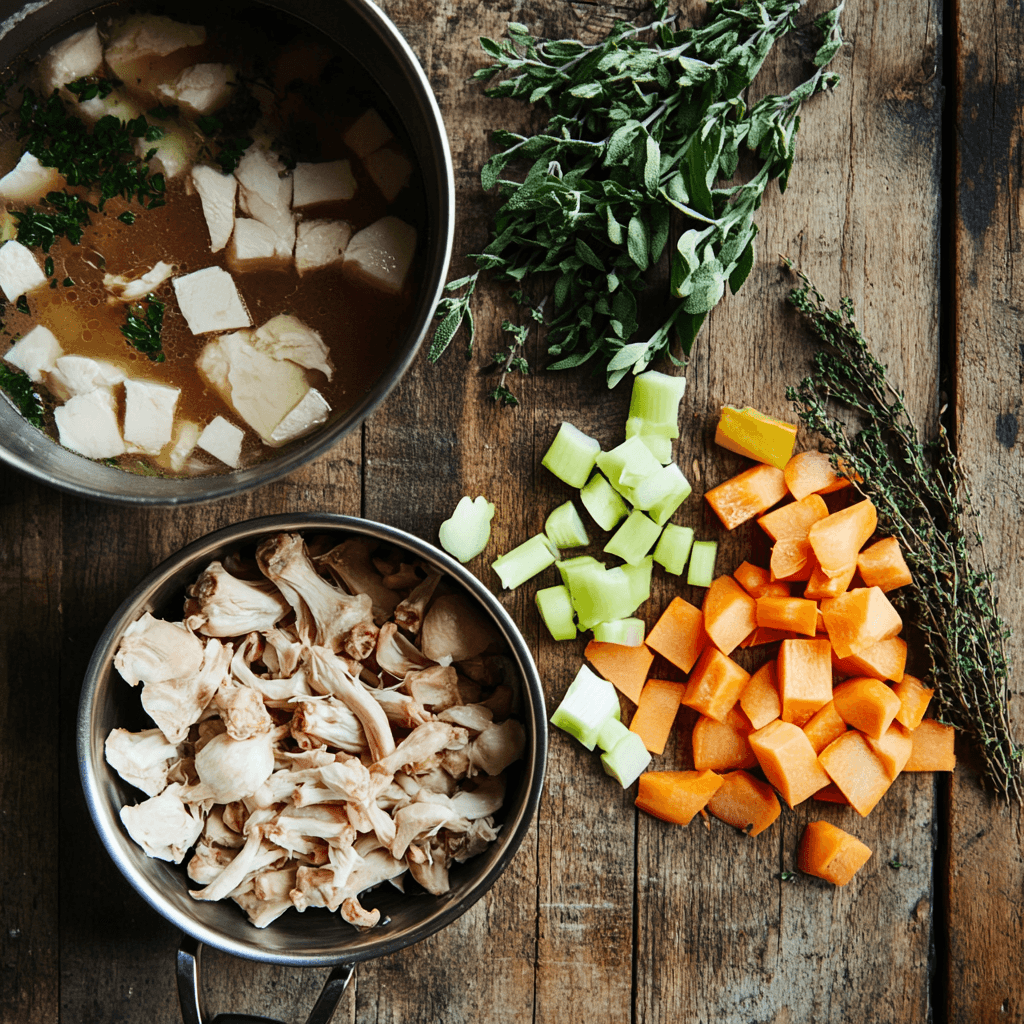Is chicken stock or broth better for turkey?
Table of Contents

Is chicken stock or broth better for turkey, When it comes to enhancing the flavor of turkey dishes, stock and broth are two essential kitchen staples. Both serve as the foundation for creating rich gravies, moist stuffing, flavorful soups, and hearty sauces, bringing depth and complexity to the meal. However, understanding their differences and the unique roles they play can significantly impact the outcome of your culinary creations.
Chicken stock is renowned for its robust, full-bodied flavor and thick, gelatinous texture, making it an excellent choice for adding richness and depth to hearty dishes. On the other hand, chicken broth offers a lighter, subtler flavor profile, ideal for recipes that require a more delicate touch.
This article aims to help home cooks and food enthusiasts make an informed decision on whether chicken stock or broth is the better choice for cooking turkey. By exploring the characteristics, applications, and benefits of each, you’ll be equipped to elevate your turkey dishes, ensuring a memorable and flavorful dining experience.
Let’s dive in to uncover the nuances of these kitchen essentials and their ideal uses for turkey dishes.
Understanding Chicken Stock

What is Chicken Stock?
Chicken stock is a culinary staple made by simmering chicken bones, often with vegetables like carrots, celery, and onions, for an extended period. The slow cooking process extracts collagen and minerals from the bones, resulting in a thick, gelatinous liquid once cooled. Stock is prized for its rich, deep flavor and is commonly used as a base for soups, sauces, and gravies.
Key Ingredients of Chicken Stock
The typical ingredients in chicken stock include:
- Chicken bones: Often roasted beforehand to enhance flavor.
- Vegetables: Carrots, celery, onions, and sometimes garlic or leeks.
- Herbs and spices: Bay leaves, thyme, parsley, and black peppercorns.
- Water: The medium for extracting flavors and nutrients.
How Chicken Stock is Made
The process involves simmering the bones and vegetables for several hours—usually 4 to 8 hours. During this time, the collagen in the bones is released, giving stock its signature thickness. The mixture is then strained, leaving behind a flavorful liquid that can be used in various dishes.
Uses of Chicken Stock
Chicken stock is the go-to choice for dishes requiring depth and body. Common uses include:
- Gravy for turkey: The rich texture of stock adds luxuriousness to gravies.
- Soup bases: For hearty turkey soups or stews, stock provides a robust foundation.
- Braised turkey recipes: Its thicker consistency enhances the dish’s moisture and flavor.
Understanding Chicken Broth
What is Chicken Broth?
Chicken broth is a lighter, more versatile liquid made by simmering chicken meat (with or without bones), vegetables, and seasonings for a shorter duration. Broth is less concentrated than stock and lacks the gelatinous texture, making it an excellent choice for recipes where a lighter flavor is desired.
Key Ingredients of Chicken Broth
The common ingredients for chicken broth include:
- Chicken meat and bones: Sometimes includes skin for added flavor.
- Vegetables: Similar to stock, broth uses carrots, celery, and onions.
- Herbs and spices: Parsley, bay leaves, thyme, and pepper.
- Salt: Broth is often seasoned, unlike stock.
How Chicken Broth is Made
Chicken broth is prepared by simmering the ingredients for 1 to 2 hours. Unlike stock, the focus is on extracting flavor from the meat rather than breaking down the bones. The resulting liquid is strained and typically ready to use as-is, with little additional preparation.
Uses of Chicken Broth
Broth’s lighter flavor and thinner consistency make it ideal for:
- Turkey basting: Keeps turkey moist and adds a subtle flavor.
- Casseroles: Complements dishes without overpowering them.
- Light soups: Works well in turkey noodle soups or brothy dishes.
Key Differences Between Chicken Stock and Broth
While chicken stock and chicken broth are similar in preparation and purpose, their differences lie in flavor, texture, cooking time, and nutritional content. Understanding these distinctions can help you choose the right option for your turkey dishes.
1. Flavor Profile
- Chicken Stock: Rich, deep, and savory due to the prolonged simmering of bones and connective tissue. Its flavor is robust and ideal for recipes requiring complexity.
- Chicken Broth: Lighter, cleaner, and more delicate, broth provides a subtler chicken flavor. It’s better suited for recipes where a mild base is needed.
2. Texture and Consistency
- Chicken Stock: Gelatinous when cooled, thanks to the collagen released from bones. This thick texture contributes to the luxurious mouthfeel of gravies and sauces.
- Chicken Broth: Thin and liquid at all temperatures, making it easier to use as-is for soups or basting.
3. Cooking Time
- Chicken Stock: Requires several hours (4 to 8) of simmering to extract collagen and minerals from the bones fully.
- Chicken Broth: Cooks in a shorter time frame (1 to 2 hours), as the focus is on infusing flavor from the meat and vegetables.
4. Nutritional Content
- Chicken Stock: Higher in protein and minerals, stock is a more nutrient-dense option due to the collagen and gelatin extracted from the bones.
- Chicken Broth: Contains fewer nutrients but is lower in calories and sodium, especially if unsalted broth is used.
How Chicken Stock Enhances Turkey Dishes

Chicken stock is a powerhouse ingredient that can elevate turkey dishes to new heights. Its rich flavor and thick consistency make it a perfect match for hearty, savory recipes.
1. Turkey Gravy
Using chicken stock as a base for turkey gravy results in a velvety, flavorful sauce. The gelatin in the stock provides a natural thickening effect, reducing the need for additional flour or cornstarch. This creates a rich and glossy finish that pairs beautifully with roasted turkey.
2. Roasting Turkey
When roasting turkey, adding chicken stock to the roasting pan can prevent the bird from drying out while infusing the drippings with a concentrated, savory flavor. These drippings can then be used to make an exceptionally flavorful gravy.
3. Turkey Soups and Stews
Chicken stock is an excellent base for hearty turkey soups or stews, especially those packed with root vegetables, grains, or legumes. Its deep flavor complements the turkey and creates a warming, satisfying dish.
How Chicken Broth Enhances Turkey Dishes

Chicken broth’s lighter profile and thinner consistency offer unique advantages in turkey dishes where subtlety and simplicity are desired.
1. Basting Turkey
Chicken broth is a popular choice for basting turkey. Its thinner consistency allows it to coat the bird evenly, keeping it moist and enhancing its natural flavor without overpowering it.
2. Turkey Noodle Soup
For a comforting turkey noodle soup, chicken broth provides a delicate base that lets the flavors of turkey, noodles, and vegetables shine. It’s perfect for lighter meals or when serving guests who prefer milder flavors.
3. Turkey Casseroles
In casseroles, chicken broth blends seamlessly with other ingredients, adding moisture and a hint of flavor without competing with the dish’s primary taste profile. It’s especially effective in creamy turkey casseroles or stuffing.
Factors to Consider When Choosing Between Chicken Stock and Broth
Deciding between chicken stock and chicken broth for your turkey dish depends on various factors, including the cooking purpose, desired flavor profile, and dietary preferences. Each option has its strengths, and understanding your needs will guide your choice.
1. Cooking Purpose
- Rich and Complex Dishes: If you’re preparing gravy, hearty soups, or slow-cooked recipes, chicken stock is the better choice. Its deep flavor and thick consistency enhance the dish’s richness.
- Light and Simple Recipes: For basting, casseroles, or brothy soups, chicken broth’s milder flavor and thinner texture make it ideal.
2. Flavor Profile
- Intense Savory Notes: Use chicken stock when you want to infuse your dish with bold, savory flavors that complement roasted turkey or rich sauces.
- Mild and Balanced Flavors: Choose chicken broth for recipes where a subtle chicken essence supports the dish without dominating the flavor.
3. Dietary Preferences
- Lower Calories and Sodium: Chicken broth is often lower in calories and sodium, making it suitable for lighter diets or low-sodium requirements. Look for unsalted versions for maximum control.
- Higher Nutritional Value: Chicken stock, with its collagen and mineral content, is more nutrient-dense and beneficial for individuals seeking additional protein and minerals.
When to Use Chicken Stock with Turkey
Chicken stock shines in recipes that require depth, richness, and body. Here are scenarios and recipes where chicken stock is the best choice for turkey dishes:
1. Turkey Gravy
A classic turkey gravy made with chicken stock is unmatched in flavor and texture. Use the drippings from the turkey roasting pan combined with chicken stock to create a smooth, luscious gravy that elevates the entire meal.
2. Braised Turkey
When braising turkey legs or wings, chicken stock provides the necessary moisture while infusing the meat with a savory essence. Its rich flavor enhances the turkey’s natural taste, creating a dish with layers of complexity.
3. Turkey Pot Pie
In turkey pot pies, the creamy filling benefits from the thicker consistency of chicken stock. It creates a velvety base that complements the turkey and vegetables encased in the flaky crust.
4. Leftover Turkey Soup
Turn leftover turkey into a hearty soup by using chicken stock as the base. Its concentrated flavor supports the turkey and makes the soup deeply satisfying, especially when paired with barley, rice, or lentils.
When to Use Chicken Broth with Turkey
Chicken broth’s versatility and lighter profile make it a great option for recipes that call for a more subtle chicken flavor. Here are situations where chicken broth works best:
1. Basting Turkey
During the roasting process, basting the turkey with chicken broth helps maintain moisture and adds a delicate flavor to the meat. The broth’s thinner consistency ensures it spreads evenly over the bird.
2. Turkey Noodle Soup
For a light and comforting turkey noodle soup, chicken broth provides a mild base that doesn’t overpower the other ingredients. It’s perfect for highlighting the freshness of vegetables and herbs.
3. Stuffing or Dressing
When moistening stuffing or dressing, chicken broth adds just enough flavor without altering the overall taste. Its lightness ensures the dish retains a balanced texture and flavor.
4. Turkey Salad or Casseroles
In recipes like turkey salad or turkey casseroles, chicken broth adds moisture and binds ingredients without introducing heaviness. It’s particularly useful for creamy dishes where other flavors need to shine.
Expert Tips for Best Results with Chicken Stock or Broth
Whether you choose chicken stock or broth, a few expert tips can help you maximize their potential in turkey dishes. These suggestions will ensure your recipes are flavorful, well-balanced, and satisfying.
1. Blend Stock and Broth for Complexity
For some dishes, blending chicken stock and broth can yield the best results. The stock provides depth and richness, while the broth adds a lighter touch. This combination works particularly well in soups and gravies where balanced flavor is key.
2. Adjust Seasoning to Taste
Chicken stock is typically unseasoned, while broth may already contain salt. When substituting one for the other, adjust the seasoning in your recipe to avoid over-salting or under-seasoning the final dish.
3. Enhance with Aromatics
Boost the flavor of store-bought stock or broth by simmering it with fresh herbs, garlic, or onion before use. This quick step enhances the overall taste and aroma of your dish.
4. Freeze Leftovers for Convenience
If you make homemade chicken stock or broth, freeze any leftovers in ice cube trays or small containers. These portions are convenient for adding to turkey dishes like soups, sauces, or basting liquids.
5. Choose High-Quality Store-Bought Options
When using store-bought chicken stock or broth, opt for high-quality brands with minimal additives. Organic and low-sodium options are great choices for maintaining flavor control in your recipes.
Is chicken stock or broth better for turkey (FAQs)
1. Can I use chicken stock instead of broth for turkey recipes?
Yes, chicken stock can replace broth in most turkey recipes. It will provide a richer flavor and thicker consistency, which is especially beneficial in gravies, stews, and hearty soups.
2. Which is healthier for turkey dishes: stock or broth?
Chicken stock is typically more nutrient-dense due to the collagen and minerals extracted from the bones. However, chicken broth may be lower in calories and sodium, making it a lighter option for certain diets.
3. Can I use turkey stock or broth instead of chicken for turkey dishes?
Absolutely! Turkey stock or broth will complement the turkey’s flavor even more closely. However, chicken stock and broth are excellent substitutes if turkey-based options aren’t available.
4. Does using stock or broth affect the cooking time of turkey dishes?
No, stock or broth will not significantly alter the cooking time. However, the choice between them may impact the dish’s final texture and flavor, depending on the recipe.
5. Can I mix chicken stock and broth in the same recipe?
Yes, mixing chicken stock and broth can provide a balanced flavor. This approach is particularly useful in recipes where you want the richness of stock but also the lightness of broth.
6. Is homemade stock or broth better than store-bought for turkey dishes?
Homemade stock or broth typically has a fresher, more authentic flavor. However, high-quality store-bought options can also work well, especially when time is limited.
Conclusion Chicken Stock or Broth
When deciding between chicken stock and broth for turkey dishes, the choice depends largely on the dish you’re preparing and the flavor profile you want to achieve.
For recipes that call for richness and depth, such as gravies, sauces, or stuffing, chicken stock is the preferred choice. Its robust flavor and gelatinous texture enhance the dish’s complexity, providing a luxurious mouthfeel and complementing the hearty nature of turkey.
In lighter preparations, such as soups or recipes where turkey’s flavor needs to shine through subtly, chicken broth is more suitable. Its delicate profile avoids overpowering other ingredients while still contributing a pleasant, savory base.
For the best results, consider using homemade stock or broth whenever possible, as it allows greater control over salt levels, fat content, and flavor balance. If using store-bought options, opt for high-quality, low-sodium varieties to maintain control over seasoning.
Ultimately, the key is to tailor your choice of stock or broth to the dish’s requirements and your personal preferences. With the right selection, you can elevate your turkey dishes and create meals that delight the palate.
Print
Is Chicken Stock or Broth Better for Turkey
Description
Chicken stock is generally better than chicken broth for turkey dishes because it has a richer, deeper flavor and a fuller texture. Stock is made from simmering bones, which releases collagen, giving it a slightly thicker consistency that complements turkey’s hearty flavor.
However, chicken broth works well if you want a lighter, less intense base that allows the natural flavor of the turkey to shine through.
Notes
- Use stock for a richer, more flavorful soup or sauce.
- Use broth for a lighter, more subtle dish.
